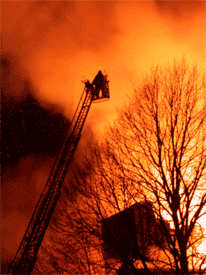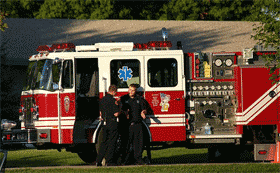 |
The last thing in the world I am is a hero. But I know heroes. I have lived among them and traveled troubled and uncertain roads with them. I have laughed and cried with them. I have stood girder straight in long lines of blue at the funerals, and crawled with them on filthy floors through blinding whirls to reach the red of fires. I have witnessed them running through the streets, guns drawn, shooting, praying they would not be shot. I have knelt beside them in gutters, handing them packaged needles and bantam bottles of drugs from their green plastic cases, along with large rolls of gauze to wipe blood spills of possible and unknown contamination. The street pros. The first-to-arrives--the men and women who often guard the gate between the sad stillness of demise and the wonderful movement of living.
 |
Look at any photo or video of a natural or a man-made catastrophe, any terrible and deadly event from Maine to California, and study the people at the scene. Look closely at them. Who are these men and women moving, carrying, lifting, and treating with such resolve--men and women who can go from situation to situation and know what to do when tragedy and chaos strike?
My firehouse in the South Bronx, when I worked there, was the busiest firehouse in the world--thirty to forty alarms every day. There were always people on the other side of those big red doors who needed help of some kind, and we firefighters weren’t the only ones willing to give everything we had to get the job done--in fires, car wrecks, home and work accidents, collapses, explosions, overdoses, shootings and knifings, stricken citizens lying helpless on sidewalks. There were always people to intercede, to mitigate: the police officers separating us from the criminals, the emergency medical technicians delivering the shock of life, the nurses in the backs of ambulances choosing the treatment of the ailing--all men and women who showed empathy, respect, and love toward strangers, just as they would for their own families.
These are people who have internalized the importance of competency. They know themselves. They have confidence in the person they see when they look in the mirror. They know the drills of triage, of decision-making, of going the extra step--the sense of purpose that inspires them every time the 911 call is answered and the alarm goes out. And, in their work, many of them will see the divide between life and death, and realize that the extra step will lead them into the dangerous and unknown. Some of them will not come back.
When I was a young firefighter I got to know one man in my firehouse. In watching him I was able to set the standard for my life's work, and to this day, he symbolizes the true meaning of heroism in my mind. A tall man, he had great strength, and was always first at the door with his tools. The lock or the barricade did not matter, this man would force the door open in seconds, because like the rest of us he knew that seconds might make the difference in making a save. And, then, no matter the heat or the smoke, he would find a way to search every room that wasn't entirely in flames. Often, he would find someone and either carry or drag them out. The mayor pinned medals to his chest. In the down times, this man always made us laugh. He knew the power of levity in bringing people together. He believed in the group ethic, and was among the first to not only scramble the eggs for lunch, but also to stand before the sink afterward and wash the pot.
When one of the guys died in the line of duty one busy afternoon in the South Bronx, I was stunned to see how my role model reacted. We had been to funerals together before, but never had duty taken one of our own, in our own firehouse, and he wept openly and fiercely. This tall, tough firefighter allowed his body to shake with grief for all of us to see, and I realized that he was making the connection that I would internalize forever, the communion between what a man stood for and what the loss would mean for his wife, his parents, and his children. That day, the sadness of that family began its certain journey through our firehouse, through all the firehouses, and throughout the city. A first responder had given a life, and we all understood that it was given for us, to keep us safe.
 |
Duty begins with the heart and a kernel of caring, and grows into action--action that is sometimes heroic. Most of us have this capacity within us, but not many of us are asked to call upon it. More than anyone, our first responders are asked to depend on their concern for others, a challenge that endures sometimes through decades of service. Our firefighters, EMTs, nurses, and police officers receive no great recompense for their work, yet they somehow buy homes, cars, and college educations for their children. They work second jobs. They vote. They don our country’s uniforms and fight in foreign deserts to defend us, and our towns and cities, and our ways. They are in almost all ways average Americans. They differ only in that they are positioned on the line that separates the rest of us from harm and tragedy. And, if you need them, they will hold that line, sometimes without reason and sometimes in great peril, to protect you.
I was at the World Trade Center and watched our first responding men and women on 9/11. On that terrible day 343 firefighters, 23 police officers, 11 registered nurses, and 6 emergency medical technicians gave their lives. They and their families have given and will continue to endure much to keep us safe. Since then in America, about 150 law enforcement officers and 110 firefighters have given their lives in the line of duty. It is a big price we pay to face guns and fire, terrorism and natural catastrophe. My hero? America's first responders--they leave no great wealth in their path, but they do leave us the memory of their character, and a legacy, when it matters most to us, of being brave.
Page created on 9/1/2006 12:00:00 AM
Last edited 9/1/2006 12:00:00 AM

About Dennis Smith
Although he had already retired from a distinguished career as a New York City firefighter, Dennis Smith rushed to volunteer at Ground Zero on September 11th when he heard that two planes had crashed into the World Trade Center. He worked tirelessly in the days and nights that followed, and continued to participate in the recovery efforts for months afterward.It was a single act of heroism in a life characterized by them. Smith spent many of his eighteen years as a firefighter at one of the city’s busiest firehouses in the South Bronx, one of its most blighted neighborhoods. His thirteen books include the bestselling Report from Engine Co. 82,and Report from Ground Zero, which chronicles his own experiences as well as those of other rescue workers in the aftermath of 9/11. With those books, he has established himself as a powerful advocate on behalf of emergency workers, the brave men and women who took center stage on September 11th when they became icons of goodness and heroism to the world, just as the attack itself represented the purest face of evil. That advocacy has culminated in the founding of First Responders Financial, which will provide financial and insurance services exclusively to first responders and their families.